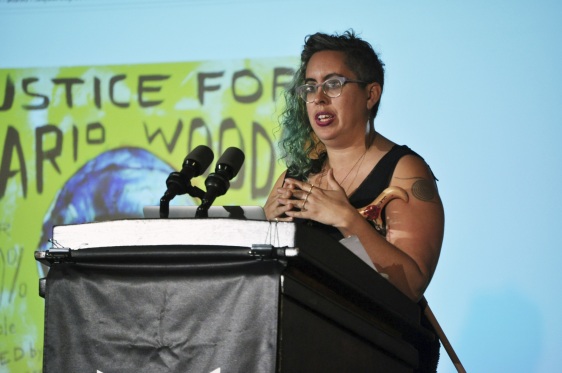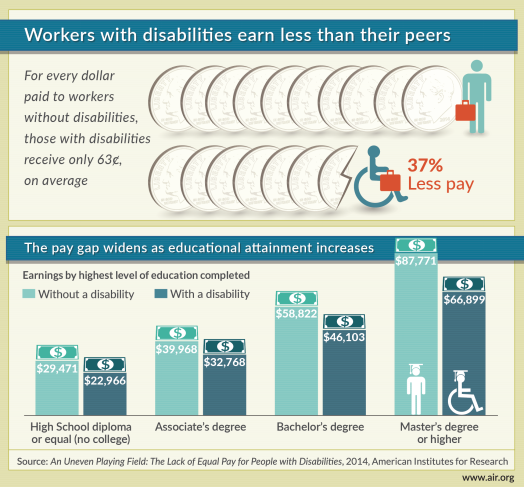Why do Disability Issues Matter?
 Women’s Center intern Prachi Kochar discusses the importance of disability in relation to many important issues that are going on today, such as police brutality and the 2016 presidential election. Rather than have disability be an afterthought, it should be brought to the forefront of our discussions about social justice issues.
Women’s Center intern Prachi Kochar discusses the importance of disability in relation to many important issues that are going on today, such as police brutality and the 2016 presidential election. Rather than have disability be an afterthought, it should be brought to the forefront of our discussions about social justice issues.
In conversations about social activism and social change, we must remember who is not being talked about. Who is being left out of these conversations and why? In particular, I have noticed a significant amount of ignorance about issues related to people with disabilities throughout my college experience, and relating to several different issues, ranging from accessibility at UMBC to the rights (and respect) of people with disabilities in 2016’s presidential race to how people with disabilities, especially those who are people of color — and especially Black people — are treated by police. People with disabilities are also often left out of conversations about social justice. Think about the last time you heard about a protest, discussion about a social justice issue, or rally. Was there any mention of wheelchair accessible-seating or sign language interpreters? This is particularly striking because 19% of the U.S. population, or 56.7 million people, have some kind of disability.
The word “disabled” and its meanings are often not critically considered, but it is important to remember that just like other identities, such as gender, race, and class, it is socially constructed. This perspective of disability emphasizes that it is society that disables people by rendering some services and institutions inaccessible to people as well as stigmatizing those who are considered to have disabilities. For example, deafness is not considered a disability by the Deaf community because within the Deaf community, there are no barriers to communication — everyone is able to use sign language and communicate clearly. It is also important to recognize that all people with disabilities cannot be lumped together. Even people who seem to have the same “type” of disability may have different needs. This is why it is especially important to listen to diverse groups of people with disabilities and center their voices and experiences, rather than non-disabled people.
Even though I am deaf, as someone who does not have any mobility issues, I initially did not realize how inaccessible UMBC’s campus is to people with mobility issues, especially wheelchair users. For example, getting to the Performing Arts and Humanities Building only seems like a minor annoyance to me, one that just requires giving myself an extra five minutes to walk up all those stairs. However, for someone in a wheelchair, chronic pain, or with crutches, it is necessary to navigate a labyrinth of ramps, building entrances, and elevators to make it to class. Furthermore, most classroom doors, and even some building entrances, do not have buttons that allow them to open automatically, meaning that they must be pushed or pulled to allow access. The same is also true for many bathroom entrances, even bathrooms that have wheelchair accessible stalls. In this way, UMBC creates more barriers for people with mobility issues. Accessibility issues at UMBC do not exist in a vacuum; they reflect how people with disabilities are viewed and treated in American society, intersecting with other dimensions of identity, such as gender, race, and class.
Police brutality against people with disabilities, especially those who are people of color, is an issue rarely spoken about, but it is a very major one. As found in a report that analyzed incidents of police brutality between 2013-2015, up to half of people killed by the police have a disability. Police officers are typically the first respondents to mental health crisis 911 calls, but they are often not trained to deal with various mental health issues as well as physical, emotional, and intellectual disabilities. Furthermore, racism and anti-blackness as well as biases against people with disabilities – where they are perceived as “dangerous” and “non-compliant” greatly contribute to police brutality.

Our Critical Social Justice keynote speaker Leah Lakshmi Piepzna-Samarsinha spoke about issues related to disability justice. You can watch the video of her lecture here! (photo credit: Mike Mower)
Another major area in which disability issues are rarely discussed (except when something particularly shocking or offensive has been said) is the 2016 U.S. Presidential Elections. Yes, I can already hear your groans, but we need to talk about how people with disabilities could potentially be affected by this election, especially because many people with disabilities are women, LGBTQ+, or people of color who already face discrimination on those fronts. You’ve probably heard about Donald Trump’s mocking of a disabled reporter and him calling Marlee Matlin an ableist slur, but very little media attention has been given to the actual policy positions of both Trump and Clinton with regard to disability issues. However, these policies can actually be life or death for some people with disabilities.

A major issue affecting people with disabilities is employment and salary equity. (credit: AIR.org)
Donald Trump has said little about people with disabilities with regard to official policy positions. Although he has praised himself for making the buildings on his properties accessible to people with disabilities (building wheelchair ramps, for example), this is mandated under the Americans with Disabilities Act. Multiple cases have also come up in which lawsuits were filed because his properties did not comply with ADA guidelines.
Hillary Clinton has been much more vocal on the topic of disability rights, using the failings of Donald Trump to emphasize how she will support people with disabilities. However, while Clinton is miles ahead of Trump on disability issues, that does not mean she is perfect. Her campaign has been criticized for portraying disability rights from the perspective of those without disabilities, rather than amplifying the voices of people with disabilities. Furthermore, despite her stated support of people with disabilities and the Americans with Disabilities Act, Clinton has not given much information on exactly how she will support people with disabilities and what specific issues she will address, creating doubt as to how effective she will be on disability-related policies. While it is important to recognize that Clinton is much better than Trump, it is also important to be critical of her policies and ask for better.
The Democratic Party has also shown their support of disability rights, by focusing on disability issues at the Democratic National Convention and having multiple speakers with disabilities as well as accommodations for all. Even though we have a long way to go with increasing accessibility for people with disability as well as awareness of the issues that people with disabilities face, it is possible for us, both people with disabilities and people without disabilities, to begin making a positive difference and to support disability justice. One of the major ways that we can do that is voting — so make sure you go out and vote if you are able to do so! Together, we can make a positive change and advocate for disability justice.
Resource Round-Up
- What You Need to Know about Disability Justice
- What is Ableism?
- 6 Forms of Ableism We Need to Retire Immediately
- 50 Million Americans Live with Disabilities – They Could Swing this Election
- #CripTheVote Campaign
- Campaign Events: Accessibility and Disabled People
- 5 Ways We Keep People w/ Disabilities Chained to Poverty
- When Disability and Race Intersect
Posted: November 8, 2016, 5:00 PM